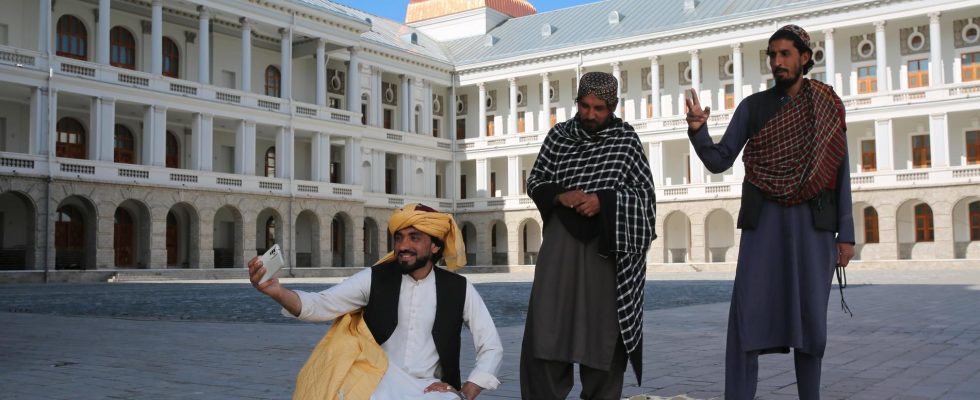unsaveSave
Afghans take selfies at the recently renovated Darullaman Palace southwest of Kabul. The palace was built by Western architects in the 1920s on the orders of King Amanullah Khan and Queen Soraya Tarzi.
1 / 3 Photo: Siddiqullah Alizai/AP/TT
The Taliban want to attract tourists to ruins of cultural heritage the extremist Islamist movement once destroyed.
At a school in Afghanistan’s capital, about 30 men study traditional crafts, anthropology – and how to interact with foreign women.
In a classroom in Kabul, a motley crowd of men crowd.
– They (foreigners) are told that Afghanistan is backward, about poverty and war. But we have a 5,000-year history. We have to show a new side of Afghanistan, says student Samir Ahmadzai, who dreams of starting a hotel, to the AP news agency.
Another student, model Ahmed Massoud Talash, wants to learn all about Afghanistan’s most Instagram-friendly places.
Women who smoke
At the Taliban-run school, no women are welcome, AP reports. The Taliban have banned girls over the age of eleven from all education.
Instead, the male students will be taught how to interact with foreign women, whose habits and behaviors are likely to be in stark contrast to local customs and injunctions. It can be about women who smoke, eat in public or hang out with men they are neither related to nor married to, AP writes.
Since the fundamentalist Taliban regained power in Afghanistan in 2021, the country has seen a sharp decline in human rights. For women in particular, freedom has been severely curtailed, both in private and in public life.
Hoping for income
At the same time, other things are on the rise. Thanks to reduced violence, tourism has increased, albeit from extremely modest levels – from just under 700 foreign visitors in 2021 to around 7,000 last year.
The Taliban are hoping for tourism revenue to the economically isolated country. But much remains before that can become a reality.
According to AP, non-existent diplomatic relations with the outside world, airlines that avoid Afghan airspace, frozen foreign assets and road networks scarred by war and mismanagement are expected to put a damper on tourism.
Afghanistan lies along the “hippie trail”, a legendary route for backpackers in the 1960s and 70s. And for those who choose to enter by land, there are, in theory, even today open border crossings to almost all six neighboring countries. But in practice, few of them work for international tourists, according to travel sites in the region.
THE FACTS The Taliban
The ideology of the Taliban movement combines an extreme and fundamentalist interpretation of Islam with the ancient cultural code of Pashtunwali, named after the Pashtun ethnic group that forms the backbone of the Taliban.
Formally, the movement was born in 1994, but the foundations were laid earlier in the Pakistani refugee camps where many Afghans fled the Soviet invasion in 1979.
In 1996, the movement captured the capital, Kabul. It controlled large parts of the country until the US-led invasion in 2001, then regained power in a blitzkrieg on 15 August 2021 after US forces withdrew.
The Taliban’s exercise of power is described as conservative, brutal and arbitrary. Just as during their first time in power, the Taliban now rule with their interpretation of Islamic Sharia law, which in practice means extreme oppression of women. Women have been forced out of universities and from the vast majority of jobs, music has been banned and public executions and whippings have been reinstated.
However, the cultural heritage has so far been spared, unlike during the previous Taliban rule. Then scores of priceless museum objects were destroyed, as well as, to the dismay of the outside world, the famous stone Buddhas from the 5th century in the Bamiyan Valley.
Read more
